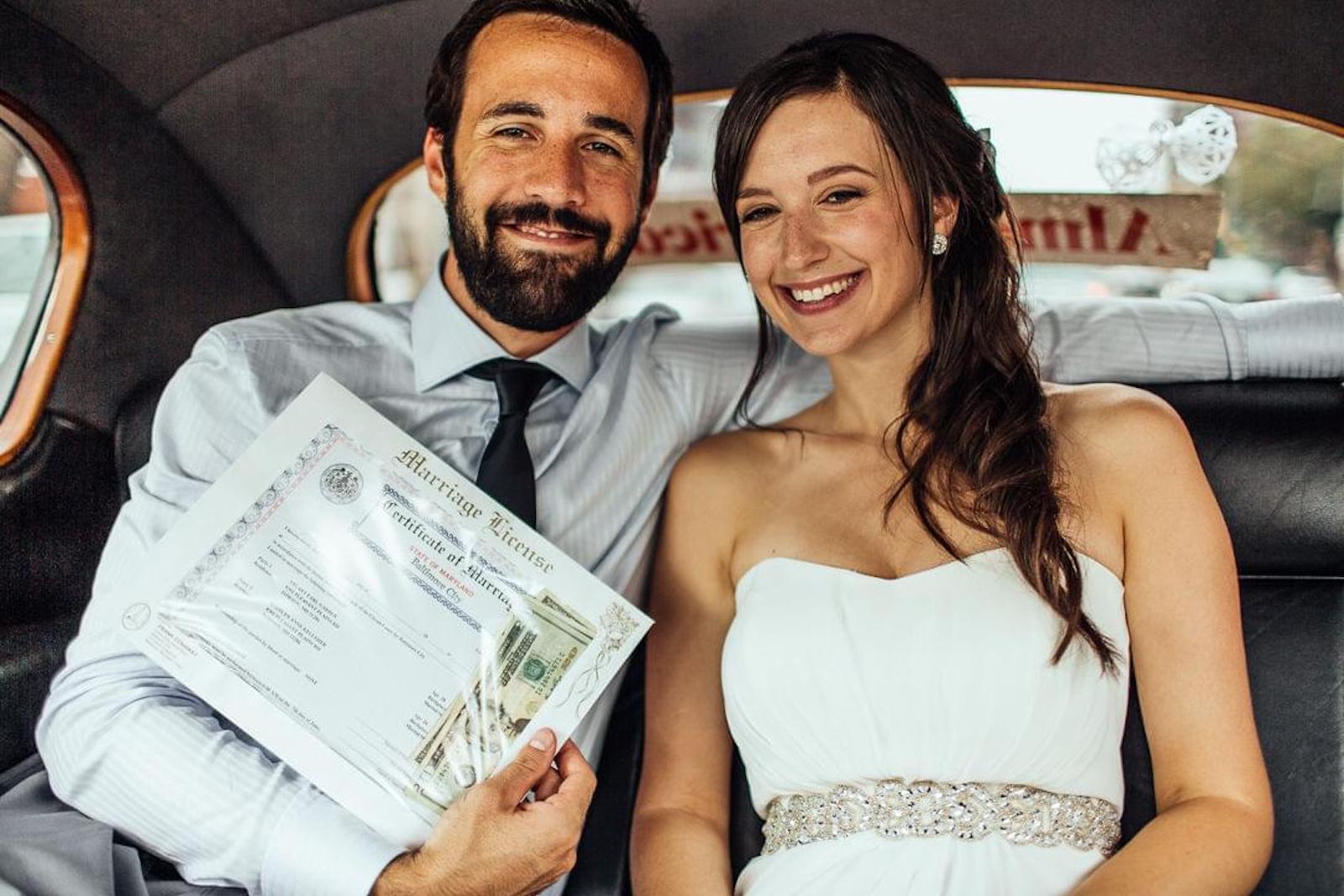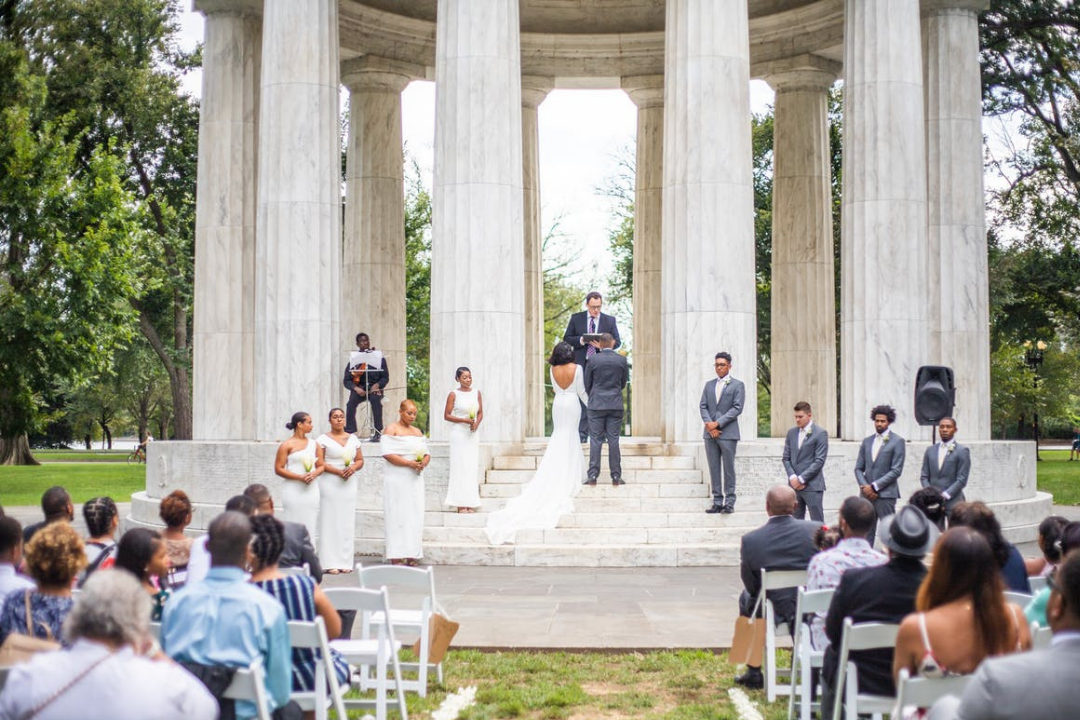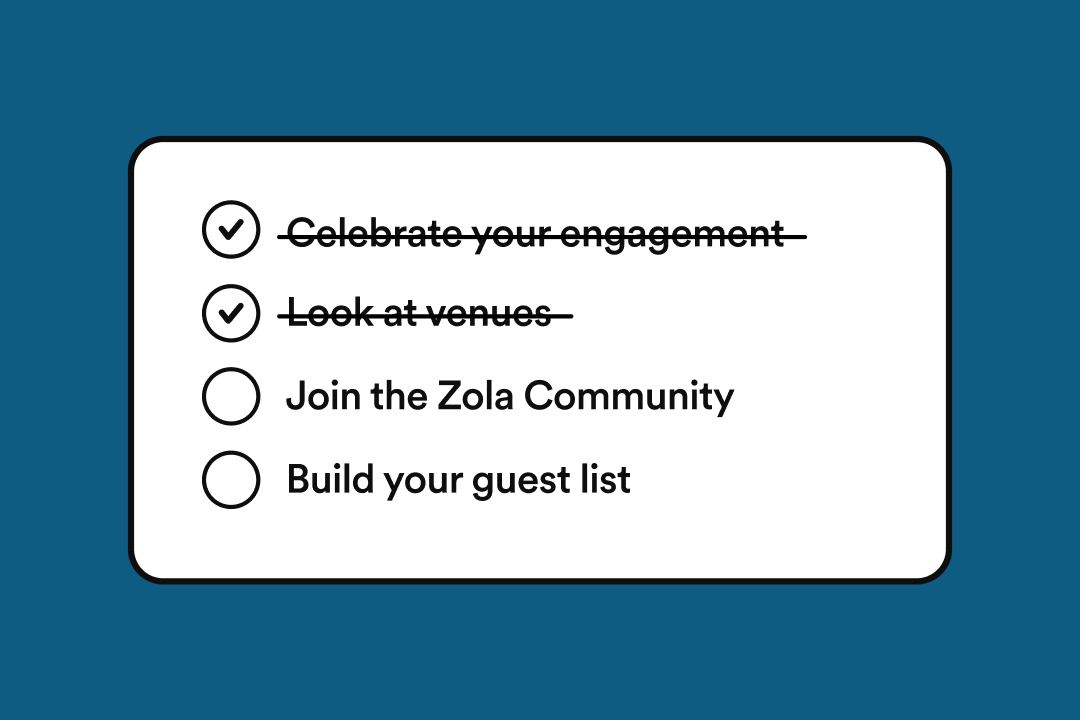- Expert advice/
- Wedding planning 101/
- Legal/
- A Guide to Marriage Licenses
- Legal
A Guide to Marriage Licenses
Your marriage license isn’t the most exciting task on your road to married life, but it is a requirement for your union to be deemed legal. So how do you go about getting a marriage license? Our guide covers it all.
Last updated February 5, 2024

When you’re in the midst of planning all the details of your wedding day, it’s easy to forget the one thing that signifies that you are actually married: the marriage license. This bit of paperwork isn’t the most exciting task on your road to married life, but it is a requirement for your union to be deemed legal. So how do you go about getting a marriage license? Our guide covers it all below.
What Is a Marriage License?
A marriage license is a document issued by the government that grants you permission to marry. It indicates that you are both legally eligible to enter into the union (i.e., neither of you are already married, underage, or otherwise ineligible for marriage).
What Is a Marriage Certificate?
While a marriage license is a permit that legally allows you to get married, the marriage certificate is the official document you receive after your wedding has taken place. The certificate is granted after the marriage license has been returned to, and deemed valid by, the office where it was issued. In other words:
- License = Permission to get married
- Certificate = Proof that you are married
Why Do I Need a Marriage License?
If you do not obtain a marriage license, your marriage will be deemed illegal according to the law. While you can choose to be married in name only, or through a religious organization exclusively, the state will not permit you the rights typically reserved for legally married couples, such as certain tax breaks, social security benefits, joint healthcare plans, and inheritance rights.
Where to Get a Marriage License?
Where you get your marriage license depends on where you’re getting married—the office or location that handles them varies by state. Depending on your state, the location might be city hall, the clerk’s office, a designated marriage license bureau, or somewhere else unique to that area.
To learn more about your state’s marriage license requirements, check out U.S. Marriage Laws.
When to Get a Marriage License?
When you should get your marriage license also depends on where your wedding will take place. Each state has its own set of rules for how long the license is valid (the license may expire if you do not get married and return the license to the state within a given number of days) and if there’s a waiting period. The waiting period is either the amount of time you have to wait between applying for and receiving the license, or a designated wait period between receiving the license and when you can tie the knot.
Again, U.S. Marriage Laws is a great resource on this topic, but your local city hall will have the most up-to-date information.
How to Get Marriage License?
The process for obtaining a marriage license will vary by state (and sometimes city or county), but the process involves an submitting an application and paying a fee. Some states allow you to apply online, but most dictate that you apply in person and that both individuals be present that wish to be married.
What Do I Need to Apply for a Marriage License?
The exact requirements depend on the state’s individual laws, but there are a few things you can expect:
- Proof of identity (and that you are of legal age to marry)
- Birth Certificate
- Social Security Card
- Driver’s License
- State ID
- Military ID
- U.S. Passport
- Proof that you are not currently married
- Divorce Decree, if you’re divorced
- Death Certificate, if you are widowed
- Proof of citizenship (or residence)
- Birth Certificate
- U.S. Passport
- Certificate of Naturalization
- __Payment for the application fee __
Consult with your state for details on laws governing marriage age, blood test requirements, proxy, common law, and cousin marriages.
Pro Tip: Some applications may ask if you’re planning a name change after marriage. Make sure that you have come to a decision before you apply.
How Much Is a Marriage License?
Fees for marriages licenses change range from $10 - $115 depending on the state, city or county where you apply. For accepted payment methods, check with your local licensing office.
Who Signs The Marriage License?
Most states require that the marriage license be signed by both spouses, the officiant, and 1-2 witnesses, but, as we’ve mentioned before, every state is different. Be sure to ask for details when you apply for your marriage license.
Where Do I File for a Marriage License If I’m Planning a Destination Wedding?
If you’re planning to wed abroad, you can file for your marriage license two ways:
1. Apply in your home state and have a civil ceremony before or after the destination wedding.
- Pros:
- It’s cheaper
- No need to file additional paperwork.
- It’s less complicated.
- Cons:
- Your official wedding date will not be the day of your destination wedding.
2. Apply for a license in the country you’re getting married in, then have your marriage legally authenticated in your home state.
- Pros:
- Your official wedding date will be the same day as your destination wedding.
- Cons:
- It can be expensive.
- You may have to hire translator (if the license isn’t in English).
- It requires additional paperwork.
- It can be complicated.
Up next for you

How to Become a Wedding Officiant
How-To
Thinking about becoming a wedding officiant? Follow these 5 steps to make it official.

The Duties of a Wedding Officiant
How-To
Find out everything you need to know about wedding officiant duties with this informative guide. Read on for more.

2024/25 Printable Wedding Planning Checklist & Timeline - Zola
Don’t miss a wedding planning detail with our complete, expert-crafted wedding checklist and timeline. Free, printable version inside!

How to Change Your Name After Marriage
How To
Thinking about changing your last name? Here's everything you need to know when considering a name change after marriage. Learn more.
Featured

What Is a Registry (And Why Do You Need One)?
Inspiration
A wedding registry is a personalized collection of gifts that an engaged couple has specifically chosen for their guests to shop from in order to make the wedding gifting experience simpler, easier, and more satisfying for everyone.

Wedding Invitation Wording: A Complete How-To Guide
How-To
Learn the how-to's of wedding invitation wording, plus formal and casual wedding invitation examples from the experts.

A Guide to Bridal Showers
Inspiration
This bridal shower guide will introduce you to the basics of bridal showers: traditional bridal shower etiquette (and which of those “rules” you can break), whom to invite, what to do, and who pays for it all.

How to Plan a Wedding: A Step-by-Step Guide
How-To
We’ll walk you through the steps of online wedding planning, highlighting all of Zola’s incredibly easy and intuitive online wedding planning tools that’ll make planning for the big day more fun and less frustrating.
- Expert advice/
- Wedding planning 101/
- Legal/
- A Guide to Marriage Licenses
Find even more wedding ideas, inspo, tips, and tricks
We’ve got wedding planning advice on everything from save the dates to wedding cakes.
